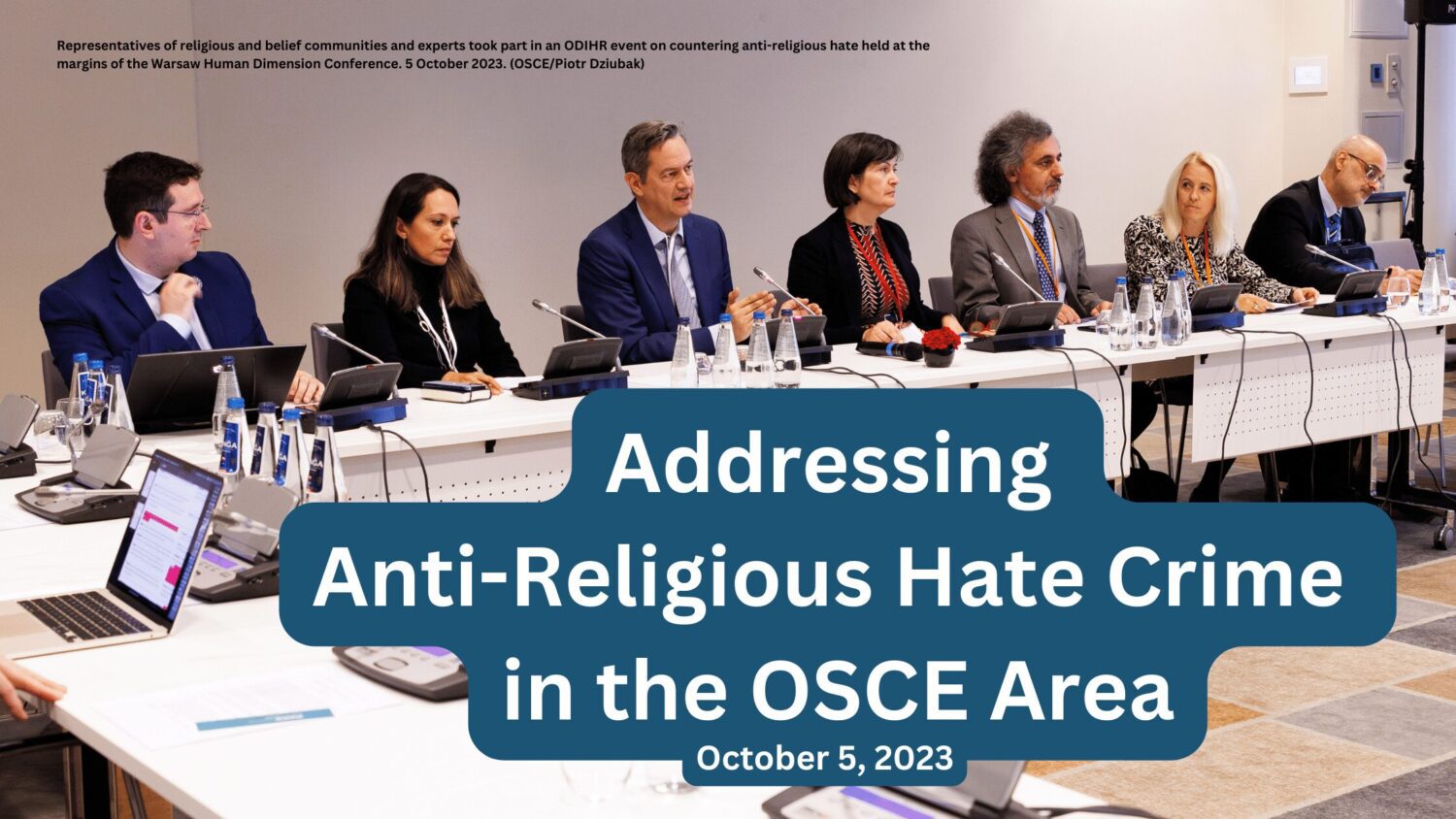Representatives of religious and belief communities, along with experts, recently gathered to discuss the issue of countering anti-religious hate crimes, at a side event organized by the OSCE Office for Democratic Institutions and Human Rights (ODIHR).
A Focus on the Precursors of Anti-Religious Hate Crimes
The event took place on the margins of the Warsaw Human Dimension Conference, organized by the 2023 OSCE Chairpersonship of North Macedonia with the support of ODIHR. The participants emphasized the importance of creating an inclusive society based on mutual respect to effectively address this issue while adding a special focus on the precursors of hate crimes.
They identified that while some of the discriminations can not be defined as hate crimes with current agreed definitions, some government attitudes and policies are planting the seeds for anti-religious hate crimes to occur against some religious denominations.
Safeguarding Communities and Cultivating a Flourishing Environment
One of the key points highlighted by the participants was the need to work towards safeguarding communities from hate-motivated crimes. This involves implementing policies and initiatives that ensure the safety and well-being of religious or belief communities. However, it was also emphasized that countering anti-religious hate goes beyond crime prevention. It is equally important to create an environment in which these communities can thrive and flourish.
Fostering Mutual Respect and Understanding
In order to effectively counter anti-religious hate crimes, participants stressed the importance of fostering mutual respect and understanding. They emphasized the need for policies and genuine dialogue that promote inclusivity and acceptance of different religious or belief systems. Kishan Manocha, the Head of the ODIHR Tolerance and Non-Discrimination department, stated that this approach not only allows individuals and communities to live free from hate, but also enables them to thrive.
Addressing Anti-Religious Hate Crimes and Intolerance
The discussions at the event focused on the commitments of OSCE states to address anti-religious intolerance and hate crimes. This includes crimes that are motivated by bias against Christians, Jews, Muslims, and members of other religions, and this case the event had a representative of the Church of Scientology who showed the discrimination and dehumanization being instigated by German authorities against this community.
The participants also discussed good practices in combating hate crime and addressing the impact of crimes motivated by multiple biases.
- Engaging with affected communities: Participants emphasized the importance of engaging with the communities most affected by anti-religious hate crimes to understand their specific security needs.
- Demonstrating commitment: Authorities were urged to demonstrate a real commitment to protecting freedom of religion or belief for all individuals. This includes swiftly condemning anti-religious hate crimes and taking proactive measures to ensure the safety of religious or belief communities.
- Building trust and inclusivity: Meaningful cooperation and communication with targeted communities should be at the centre of states’ efforts to build equal, open, and inclusive societies.
ODIHR’s Initiatives
During the event, ODIHR presented its various programs, resources, and tools that can be utilized by OSCE participating States and civil society to address anti-religious hate. One notable resource is ODIHR’s Hate Crime Report, which provides data and information on hate crimes in the OSCE area.
Overall, the event served as a platform for participants to discuss the current challenges and share insights on countering anti-religious hate. The key takeaways highlight the importance of inclusivity, mutual respect, and meaningful engagement with affected communities in creating societies that are free from hate and discrimination. By fostering an environment in which religious and belief communities can thrive, the aim is to build equal, open, and inclusive societies for all.
The speakers were Eric Roux (Co-Chair, FoRB Roundtable Brussels-EU), Christine Mirre (Director, Coordination des Associations et des Particuliers pour la Liberté de Conscience – CAP Freedom of Conscience), Alexander Verkhovskiy (Director, SOVA Research Center), Isabella Sargsyan (Program Director, Eurasia Partnership Foundation; Member, ODIHR Panel of Experts on Freedom of Religion or Belief) and Ivan Arjona-Pelado (President, European Office of the Church of Scientology for Public Affairs and Human Rights).













 English
English French
French Spanish
Spanish German
German Dutch
Dutch Italian
Italian Danish
Danish Portuguese
Portuguese Greek
Greek Russian
Russian Swedish
Swedish Bulgarian
Bulgarian Hungarian
Hungarian Catalan
Catalan Ukrainian
Ukrainian Polish
Polish Basque
Basque Chinese (Simplified)
Chinese (Simplified) Japanese
Japanese Hebrew
Hebrew Arabic
Arabic Swahili
Swahili Amharic
Amharic Irish
Irish Afrikaans
Afrikaans Albanian
Albanian Armenian
Armenian Azerbaijani
Azerbaijani Belarusian
Belarusian Bengali
Bengali Bosnian
Bosnian Cebuano
Cebuano Chichewa
Chichewa Chinese (Traditional)
Chinese (Traditional) Corsican
Corsican Croatian
Croatian Czech
Czech Esperanto
Esperanto Estonian
Estonian Filipino
Filipino Finnish
Finnish Frisian
Frisian Galician
Galician Georgian
Georgian Gujarati
Gujarati Haitian Creole
Haitian Creole Hausa
Hausa Hawaiian
Hawaiian Hindi
Hindi Hmong
Hmong Icelandic
Icelandic Igbo
Igbo Indonesian
Indonesian Javanese
Javanese Kannada
Kannada Kazakh
Kazakh Khmer
Khmer Korean
Korean Kurdish (Kurmanji)
Kurdish (Kurmanji) Kyrgyz
Kyrgyz Lao
Lao Latin
Latin Latvian
Latvian Lithuanian
Lithuanian Luxembourgish
Luxembourgish Macedonian
Macedonian Malagasy
Malagasy Malay
Malay Malayalam
Malayalam Maltese
Maltese Maori
Maori Marathi
Marathi Mongolian
Mongolian Myanmar (Burmese)
Myanmar (Burmese) Nepali
Nepali Norwegian
Norwegian Pashto
Pashto Persian
Persian Punjabi
Punjabi Romanian
Romanian Samoan
Samoan Scottish Gaelic
Scottish Gaelic Serbian
Serbian Sesotho
Sesotho Shona
Shona Sindhi
Sindhi Sinhala
Sinhala Slovak
Slovak Slovenian
Slovenian Somali
Somali Sundanese
Sundanese Tajik
Tajik Tamil
Tamil Telugu
Telugu Thai
Thai Turkish
Turkish Urdu
Urdu Uzbek
Uzbek Vietnamese
Vietnamese Welsh
Welsh Xhosa
Xhosa Yiddish
Yiddish Yoruba
Yoruba Zulu
Zulu